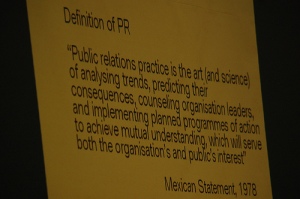In my public relations tactics course, we were assigned to write a letter to anyone we wanted. Most wrote to companies supporting products or to legislators supporting the smoking ban. I wrote a letter to the President of Michigan State University asking to adopt a code of ethics. Go figure.

A view of MSU's north side of campus.
I’m not posting this because I’m frustrated with the university – in fact, I kind of think MSU is the greatest place in the world. I wanted to post the letter to see what you think about it. Do you think a university should have a code of ethics? Is there any public relations value in having such a code? Would students care about this? I think yes to all of the above, but what do you think?
“Dear President Simon,
As a student at Michigan State University, I cannot put into words how grateful I am for the opportunity to live, learn and grow on this campus. I arrived at MSU in 2006, and I am proud to say attending this university has been the best decision I have ever made.
However, I believe that the university is missing a key component in its quest to educate students. This component is a code of ethics, and it is incredibly important for any business or institution to adopt and implement. Part of the MSU Mission Statement describes how the university strives to provide outstanding education to students so they can “contribute fully to society as globally engaged citizen leaders.” I believe that now more than ever, it is essential for this university to demonstrate a strong ethical base to shape future leaders. While there are several ethics classes offered in the university, there is not any single thing that ties everything together. This is an opportunity the university can use to be a leader for its students, faculty, staff and the community.
I was disappointed to see that ethics was not part of the university’s core values. Quality, inclusiveness and connectivity are all important ideals and the university does a tremendous job integrating these in various forms throughout campus, but a commitment to ethics is just as important as these values. In my own experience as the Chapter President of the Public Relations Student Society of America, our code of ethics is a driving force behind the organization. We strive to educate and inform our student members about the importance of making ethical career choices. The public relations industry is often a punching bag because of critics claiming we lack principles and morality, but our organization is working to overcome these perceptions. While the university does not have an unethical reputation, I believe that an overlying theme of ethical behavior on campus would greatly contribute to the education of every student.
The University of Virginia Code of Ethics, which is available on the university’s Web site, demonstrates how a code of ethics can be integrated within the goals and purpose of the university. If MSU truly strives to “advance knowledge” and “transform lives,” having an ethical base is key to success.
One challenge facing a code of ethics, whether it is within a business or organization, is holding the members accountable to their actions. However, by challenging everyone affiliated with the university, including professors, administrators and students, to uphold the highest ethical standards, I believe this university can leave a mark on each individual. Furthermore, these individuals will be able to share and spread their knowledge and values.
Ethics is essential in any field of study and these principles will take MSU to a higher echelon of professional development. I genuinely hope that you will consider adopting a code of ethics university-wide in order to serve as a model for your students.”
Filed under: Professional Development, Public Relations, class, code of ethics, college, michigan state university, students, university ethics










Recent Comments